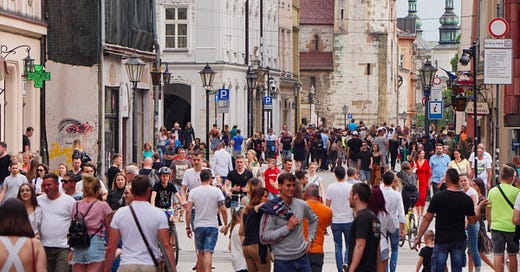Poland and Britain are poles apart in growth prospects
The average standard of living in Britain has not risen in a decade.
“Reducing the huge differences in income between countries is one of our time’s greatest challenges". Thus the trio in receipt of the 2024 Nobel Prize for economics, Daron Acemoglu, Simon Johnson and James Robinson, for their work on wealth disparities between nations. They found that institutions created to exploit the masses were bad for long-run growth, while those establishing economic freedoms and the rule of law aided it.
This is all very comforting for western democracies, where we pride ourselves on ticking both those boxes and don’t, on the whole, go about deliberately creating institutions to exploit the masses. Yet it is clear from the UK’s recent experience that, while the two qualities may be necessary, they are far from sufficient.
The average standard of living in Britain has not risen in a decade. The gross national product per head has hardly changed since before the financial crisis of 2008. The best guess looking ahead is that we will get slightly richer, very slowly, and fall further behind the United States. Even more embarrassing is the prospect for Poland. In the last 24 years, it has propelled itself from a middle-income economy to the threshold of a high-income one. The projections suggest that its GNP per head will surpass that of the UK as soon as 2027.
This is not quite the reduction in income difference that our Nobel prize winners had in mind; levelling down rather than levelling up. Poland is hardly the liberal elite’s idea of a model economy, and politics there is rougher than it is here. But it might be worth remembering that it is only a generation and a half away from a brutal totalitarian rule - one which might be said to be deliberately exploiting the masses. Having seen how ghastly this can be, it is little wonder that the Poles have such a strong work ethic. Viewing events to the east will also have concentrated their minds.
However, the prizewinners’ recipe for economic success makes sense. “The essential step is to force incumbents to compete, encourage entrants and open the economy to those who were historically outsiders”. Our newish government spent a long day last week trying to do this, as indeed has every recent administration. Unfortunately, all the signs are that, having been encouraged in, the entrants will be sandbagged by higher costs from National Insurance, struggling in the quagmire of workers’ rights, and the prospect of more tax on their gains.
Growth, that holy grail of all modern politicians, is easy to recognise but hard to generate. We will hear a lot about it the week after next, and it may be that the foreign capital will come here despite the sandbagging, but one thing history teaches us is that governments are bad allocators of capital.
The latest example is the half-billion pound payments to prop up the steel industry in Wales and Scunthorpe. These plants have no long-term future at scale, even if the electricity can somehow be found to produce “green” steel. Without continuing subsidies, they can never be competitive because the price of energy in the UK is high and getting higher.
These payments are effectively anti-growth, in that they consume more wealth than they create. They make the task of actually growing the economy harder. Projects like HS2 do produce something of value, but at a cost which far exceeds the benefits. All these “investments” are essentially political. Rather than science-based policy making, we are getting policy-based science. No wonder the growth prospects are so poor.






